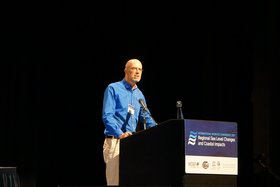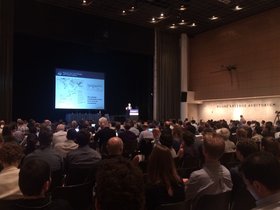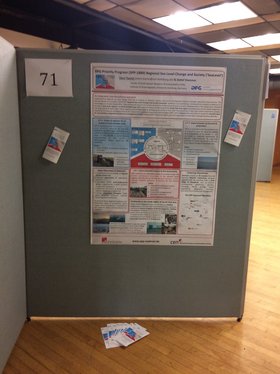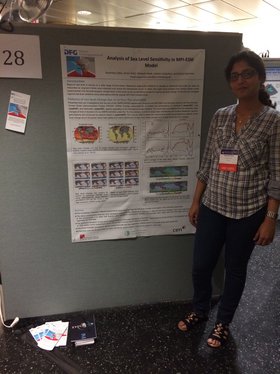Regional Sea Level Changes and Coastal Impacts Conference in New York
Last week, over 350 world experts from 41 countries, including top scientists, city planners, coastal zone developers and managers, and other stakeholders gathered at the “Regional Sea Level Changes and Costal Impacts” Conference in Columbia University, New York, to discuss on the pressing issue of regional sea level change, its current and future impacts on coastal communities globally, as well as to brainstorm on how to strengthen climate change adaptation and disaster resilience.




The final statement of the conference, with a list of signatories, can be found here.
The SPP SeaLevel program was there too, together with many of our researchers and early career scientists who participated in the conference and presented their work!
The meeting, organized by the World Climate Research Program (WCRP) and the Intergovernmental Oceanographic Commission of UNESCO (IOC), and held 11 years after the first WCRP sea level conference (Paris, 2006), addressed the prevailing challenges in describing and projecting regional and coastal sea level changes, and in quantifying intrinsic uncertainties.
“Let’s get down to facts. How is sea level likely to change at the regional level over the next 30 years? And what response options do coastal cities have?” said Prof. Detlef Stammer (University of Hamburg, Center for Earth System Research and Sustainability (CEN)), primary coordinator of the SPP SeaLevel Program and co-chair of the Conference Scientific Organizing Committee.
The objectives of the Sea Level 2017 Conference were to:
- Identify the key factors contributing to past, present and future regional sea level rise and its variability.
- Reduce the uncertainties of these factors.
- Identify stakeholder needs for sea-level information for coastal planning and management purposes.
- Define the requirements for new and augmented research, technical development and observations consistent with the above.
The conference, consisting of many diverse oral and poster sessions with more than 250 poster presentations, presented the state-of-the-art research, covering a wide range of topics of sea level, such as understanding historical paleo records and GIA modelling; contributions from glaciers and ice sheets; millennial-scale ice sheet and sea level interactions; contemporary sea level change, improvements in closing the sea level budget and unresolved uncertainties on all components; the current progress in projections of sea level rise on global and regional to local scales, as well as the big challenges that still remain.
Participants of the conference who presented posters included many of our SPP SeaLevel researchers, such as: Dr. Thomas Mann (ZMT Bremen) from the SEASchange project presenting “Geophysical modeling results and mid-Holocene relative sea level data from Northern Java, Indonesia”; Dr. Alessio Rovere (MARUM/ZMT Bremen) from the SEASchange project; Dr Martin Horwath (TU Dresden) from the OMCG project, Prof. Monika Rhein (MARUM/Uni Bremen) from the Labsea Melt project with a poster on “Distribution of glacial melt near and off Greenland”, Dr. Armin Köhl (Uni Hamburg) from the DECVAR project with a poster “On the Potential to Detect Climate Change Signals in Observed Regional Sea Level Trends”; Dr Johann Jungclaus (Max Planck Meteorology) and Dr. Sayantani Ojha (Uni Hamburg) from the DECVAR project with a poster on: “Analysis of sea level sensitivity in MPI- ESM model”; Prof. Boris Braun (Uni Köln) and Ms Lisa-Michéle Bott (Uni Köln) from the TRANSOCAP project presenting “Coastal and regional sea level rise, subsidence and collective adaptation processes in Semarang, Indonesia”; Prof. Athanasios Vafeidis (Uni Kiel), and Dr. Daniel Lincke (Glocal Climate Forum) from the SEASCApe Baltic project; as well as the Coordination team, i.e. Prof. Detlef Stammer (Uni-Hamburg, CEN), and Dr. Eleni Tzortzi (Uni-Hamburg, CEN) who presented an overview of the SPP SeaLevel Program, its objectives and current activities.
Among others, specific scientific issues addressed were the effects of a warming ocean and melting ice sheets on future regional sea level change, the respective contributions to coastal sea level rise, and its impact on the coastal environment and communities. A main aim of the conference was to provide the most advanced information on expected coastal sea level change required by coastal communities for adaptation and planning purposes. For this, a whole day of the meeting was devoted to the coastal zone, followed by a panel discussion on sea level rise adaptation in Greater New York: the response to Sandy and beyond, which focused on lessons learned from the storm that caused widespread damage to houses and infrastructure and billions of dollars in economic costs, as well as human casualties, in October 2012. Dr. Jochen Hinkel (Global Climate Forum), principal investigator of the SEASCApe Baltic project, also gave a talk on sea level information for coastal adaptation decision making: “Different decision-making contexts require different decision-making methods and scientific information. The confidence that physical scientists place on results is an essential piece of information”.
In order to strengthen the dialogue between scientists, stakeholders and the public, a public Outreach Event was held on 12th July, offering an opportunity to people from New York City and around the world to pose their questions and concerns about climate and sea level changes, and coastal communities to obtain an insight into options to minimize adverse effects of sea level rise. In turn, scientists benefited from understanding better the practical impacts of sea level rise on the coastal areas.
Equally important, a great emphasis was given to the next Intergovernmental Panel on Climate Change (IPCC) assessment (AR6), which aims to give governments the scientific, technical, and socio-economic information relevant to understanding the scientific basis of risk of human-induced climate change, its potential impacts, and options for adaptation and mitigation. The IPCC AR6 schedule was presented, which includes a special report on 1.5°C of global warming (scheduled for release in Fall 2018) and an oceans and cryosphere special report (schedule for release in Fall 2019), both of which will discuss the latest science of sea level rise.
Further information on the outcomes and summaries of the daily conference highlights can be found here:
- Summary of Day 1: Scientists begin conference on sea level change, starting with the past and working towards the future
- Summary of Day 2: Understanding today’s sea level: trends, amplitude, and new approaches
- Summary of Day 3: Risk, adaptation strategies, and stakeholder needs for coastal zone management
- Summary of Day 4: The dynamics of sea level rise today and into the future
